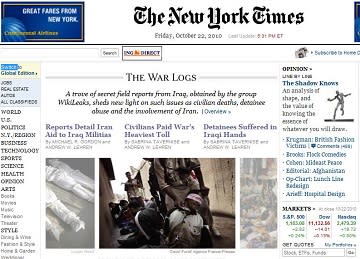 The Upshot
The UpshotNYT editor defends publishing WikiLeaks’ Iraq docs

Dean Baquet, Washington bureau chief for the New York Times, stressed Friday that his paper worked on its stories pulled from WikiLeaks' cache of nearly 400,000 documents "as it would any other journalistic project."
The Times may have treated the document cache as just another investigation, but it's not every day reporters get to dig through what's been called the largest U.S. intelligence leak ever.
Baquet balked at the notion that the Times worked "with" WikiLeaks, the online whistleblower site that obtained classified military memos relating to the Iraq war and provided them to news outlets under embargo until late afternoon Friday.
The Pentagon has repeatedly condemned the secretive organization. A former army private, Bradley Manning, is suspected of leaking documents to WikiLeaks and is currently imprisoned.
"We went through the documents, chose what we thought was newsworthy, took into account whether any information would endanger lives, went to the government for comment, then made the judgments ourselves about what to publish," Baquet said in an email to The Upshot.
"This is what we do every day," Baquet continued. "WikiLeaks played no role in that. Nor did anyone else either. In the end, [executive editor] Bill Keller and the other editors determined that this was important news about one of the most important and much-debated chapters of American foreign policy."
Similar to its release of classified Afghanistan documents, WikiLeaks made them available to several newspapers — The Guardian (U.K.), Le Monde (France), and Der Spiegel (Germany) — and networks such as Sweden's STV and Al-Jazeera, the latter of which noted receiving the materials 10 weeks ago. (The documents can be found here).
WikiLeaks founder Julian Assange expressed frustration to the New Yorker over news outlets not following up after the site posted large amounts of documents online. Lately, Assange has found more success in generating buzz through the strategy first employed around the Afghanistan leak: Provide reputable news organizations with the documents and several weeks or months to pore through them, do original reporting, confirm information with officials, and prepare original reports.
That media strategy gives journalists time to dig through them, and the results are digestible reports with context, as opposed to an amorphous cache of military memos that the average reader is unlikely to look at. This time, WikiLeaks went beyond print and offered the documents to broadcast outlets, too.
But not everyone signed on.
"CNN was offered access to the documents in advance of the release but declined because of conditions that were attached to accepting the material," a spokeswoman told The Upshot. (CNN requested an interview with WikiLeaks founder Julian Assange, and it was granted).
The Pentagon has been preparing this week for the Iraq document dump and in recent months has often blasted WikiLeaks for not returning "stolen property."
The Times, in a statement accompanying several articles posted Friday, addressed the Pentagon's concerns:
The New York Times told the Pentagon which specific documents it planned to post and showed how they had been redacted. The Pentagon said it would have preferred that The Times not publish any classified materials but did not propose any cuts. Geoff Morrell, the Defense Department press secretary, strongly condemned both WikiLeaks and the release of the Iraq documents.
Baquet also said that the Times "did go to the White House for comment, as we did last time."
